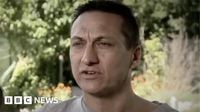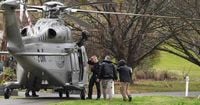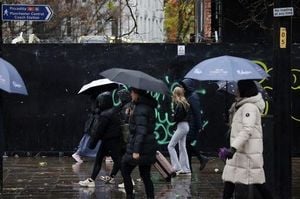In the quiet rural town of Porepunkah, nestled in Victoria’s scenic alpine region and known for its vineyards and mountain vistas, an ordinary Tuesday morning on August 26, 2025, was shattered by violence that has since gripped Australia. Ten armed police officers, some from specialized units investigating sexual offenses and child abuse, arrived at the property of 56-year-old Dezi Freeman to execute a search warrant. What followed was a tragedy that has left the nation reeling, as two officers were killed and a third seriously wounded in a shocking attack described by authorities as a “cold-blooded” murder.
According to Victoria Police Chief Commissioner Mike Bush, the officers were “met by the offender and they were murdered in cold blood.” The slain officers—a 59-year-old detective and a 35-year-old senior constable—have not yet been named publicly, out of respect for their families. The wounded detective survived after surgery and, while “significantly damaged,” is expected to recover, Bush told reporters, as cited by BBC and The Associated Press.
The aftermath saw Freeman, heavily armed and with a reputation for wilderness survival, vanish on foot into the dense bushland surrounding his property. The ensuing manhunt has entered its second day, with hundreds of officers, helicopters, and armored vehicles scouring the vast, forested region. Authorities have warned local residents to stay indoors, with public buildings and the local airfield closed, and the town’s school—home to just over 100 students—placed in lockdown for hours before children were allowed to return home.
Freeman’s background has become a focal point of both the investigation and public debate. Media outlets including The Age and Sydney Morning Herald have described him as a radicalized conspiracy theorist and self-professed “sovereign citizen”—a movement whose adherents reject the legitimacy of government and law enforcement, often citing debunked legal theories. In a 2021 video taken in Wangaratta Magistrate’s Court, Freeman was seen attempting, unsuccessfully, to “arrest” a magistrate and police officers while representing himself in a hearing. The Victoria Supreme Court, in a 2024 ruling on Freeman’s challenge to his suspended driver’s license, noted his “history of unpleasant encounters with police officers,” whom he referred to as “Nazis” and “terrorist thugs.”
During a 2024 court hearing, Freeman reportedly likened the sight of police officers to “an Auschwitz survivor seeing a Nazi soldier,” a statement that underscores the depth of his animosity toward law enforcement. While police have yet to confirm whether Freeman’s beliefs directly motivated the attack, the incident has reignited national conversations about extremist ideologies and the risks they pose to public safety. As reported by BBC, Australian Prime Minister Anthony Albanese drew parallels to the 2022 Queensland siege, in which two officers were killed by Christian extremists espousing conspiracy theories. “This threat is very real and that we need to be very vigilant about it,” Albanese said in an interview with ABC.
Chief Commissioner Bush has been careful not to speculate about the details of the search warrant or Freeman’s motivations. “It’s too soon to say” if the attack was ideologically driven, he told reporters, adding that the attending officers included members of a unit investigating sensitive offenses. However, the fact that Freeman’s sovereign citizen beliefs and prior antagonism toward police were known to authorities has prompted questions about how such risks are assessed and managed.
The situation in Porepunkah remains tense and uncertain. Despite rumors that Freeman may have taken his family hostage, police quickly clarified that his partner and two children were safe, having visited a police station late Tuesday night to speak with officers. As of Wednesday, August 27, there have been no confirmed sightings of Freeman since he fled the scene, and authorities are focusing their efforts on a “very, very wide” area of dense bushland. “He will know that area better than us, so that is why we are putting in every expert, supported by local knowledge,” Bush explained, highlighting the challenges posed by Freeman’s bushcraft expertise.
The impact of the shooting has been deeply felt not only within the police force but across the wider community. Wayne Gatt, Secretary of the Police Association Victoria, described an “eerie feeling of dread” that settled over police stations upon hearing the news. “Police stations have fallen silent in Victoria when we were first notified,” he said, as quoted by The Associated Press. Alpine Shire Mayor Sarah Nicholas echoed these sentiments in a social media message, her voice breaking as she spoke of a day of “deep sorrow and shock” for the town. “We are grieving together, and we will continue to support one another with compassion and care,” she said.
For many Australians, the rarity of such violence against police officers has magnified the shock. The last police officer killed on duty was in South Australia in 2023, and before that, the 2022 Queensland siege marked another dark chapter. These incidents are still outliers in a country where strict gun laws, enacted after the 1996 Port Arthur massacre, have drastically reduced firearm-related deaths. Nonetheless, each such tragedy brings renewed scrutiny of the nation’s approach to both gun control and the monitoring of extremist threats.
Porepunkah itself, a gateway to Victoria’s alpine tourist region, is more accustomed to the bustle of visitors than the presence of police helicopters and armored vehicles. Its residents, now urged to remain indoors for their own safety, are grappling with fear and uncertainty. “Be vigilant, keep yourselves safe,” Bush urged the community. “Please don’t go outside if you don’t need to.”
As the search for Dezi Freeman continues, questions linger about how a man with a documented history of confrontations with police and radical beliefs was able to unleash such violence. Authorities remain focused on capturing the suspect, but the tragedy in Porepunkah has already left an indelible mark on the community and the nation at large. The events of August 26, 2025, will resonate for years to come, serving as a somber reminder of the risks faced by those who serve and the ongoing challenges posed by extremism—even in the most peaceful corners of Australia.






